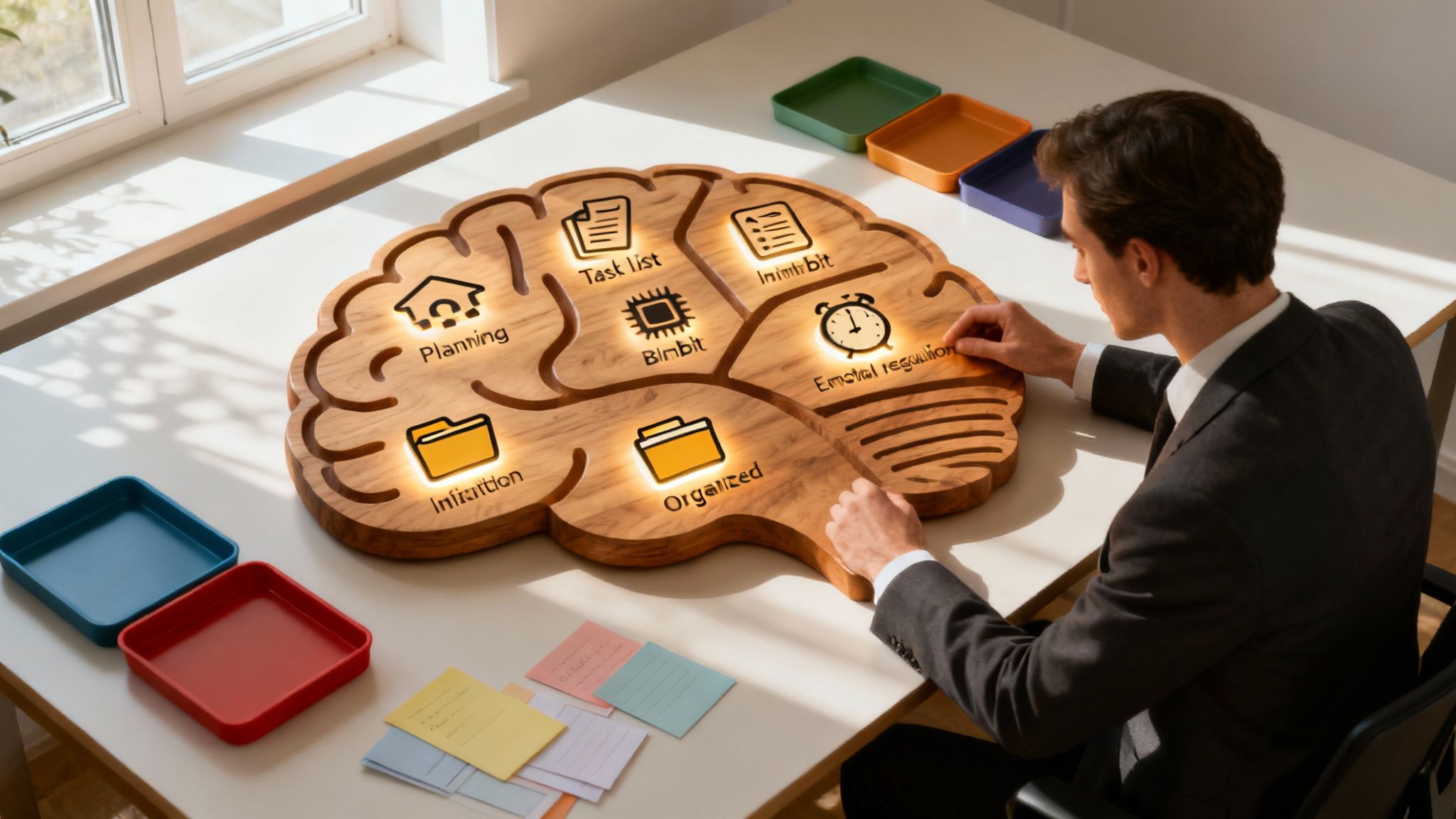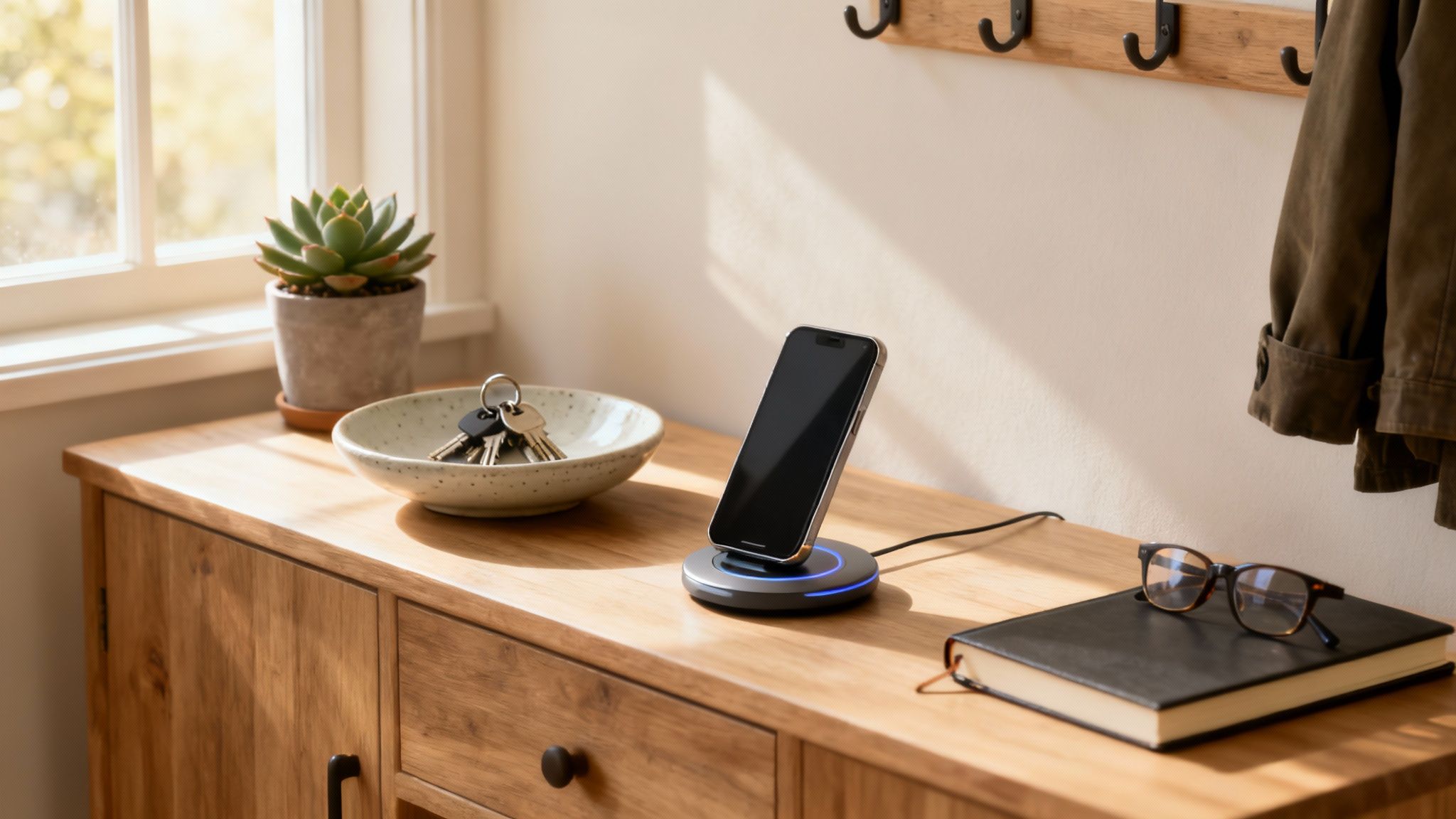As an adult, you should know how long it takes to get ready in the morning and how many weeks a work project requires. In addition, we're supposed to know what time it is now, how quickly time passes, and how much time is left.
People with attention-deficit/hyperactivity disorder (ADHD) are naturally inclined to hyperfocus on the present. So it's often difficult to maintain awareness of time.
Let's dig into time blindness (aka time myopia), which can affect anyone, but is especially common in ADHDers. We'll explore potential causes and the effects of time blindness and offer tips on how to overcome it.
Too long; didn't read
- Differences in processing time characterizes time blindness.
- ADHDers commonly experience time blindness.
- People with time blindness struggle with estimating time, how much has passed, and how much time a task requires.
- Time blindness is implicated in executive dysfunction, negatively affecting planning, prioritization, organization, and time management.
- Overcoming time blindness: Strategies like adding buffer time to your appointments, tracking recurring tasks, or developing routines can be helpful.
What is time blindness?
People with time blindness have less awareness of the passage of time, which makes it hard for them to plan effectively. As a result, they need help determining how much time they'll need to complete tasks.
They tend to leave out some activities when planning tasks. When thinking about grocery shopping, for example, they may overlook that in addition to 30 minutes inside the store, they need another 20 minutes to drive there and back.
Time blindness can cause people to experience the following:
- Being late or very early for appointments
- Misjudging how long a task takes
- Frequently missing important deadlines
- Being distracted when transitioning from one task to another
- Procrastination
What is the "time horizon"?
Your time horizon is how far you can look and plan for the future. While it is only about an hour for most children, it increases with age.
By adulthood, most people's time horizons are several months, or even years. People with ADHD, on the other hand, tend to have significantly shorter time horizons.
The link between time blindness and ADHD
.jpg)
It's thought that time blindness may result from how the ADHD brain perceives time differently.1
ADHDers usually live in the now rather than in the future or past when it comes to tasks. This can be good in some instances, but when you're trying to make a living in a world where clocks and schedules are crucial? Not so much.
However, some studies show that the connection between ADHD and time perception isn't as solid as some may think.2 Not everyone with ADHD experiences time blindness.
How does time blindness show up in ADHD?
ADHDers affected by time blindness often struggle with the following:
- Time perception: awareness of time passing and remaining
- Time sequencing: remembering the order of events
- Time reproduction: Repeating a task in the same amount of time as before
These difficulties can affect executive functioning skills, such as planning complex tasks, prioritization, or staying on top of a busy schedule.
Manifestations of time blindness are often mislabeled as poor time management skills.
They include:
- Often losing track of time and feeling like time is slipping away.
- Challenges with time estimation: How much time has passed, how much is left before an event, how long ago something happened, and how long a task will take.
- Being late (or very early) to appointments
- Missing deadlines
- Difficulty making a realistic schedule or sticking to one
How to overcome time blindness

People who experience time blindness can lessen its impact, by taking some or all of the following actions.
1. Identify and avoid "time sucks."
Be aware of the types of activities in which you tend to get lost. For example, you may lose awareness of time when listening to jazz music. Then, hours after turning it on, you realize you completely overlooked your obligations that afternoon.
That tells you that - to listen to jazz music, you either need to have nothing else on your schedule that day, or find a way that forces you to recognize the time.
Your solution may be that you only listen to playlists with a hard stop built into them, so you know when a certain amount of time passes.
2. Set multiple alarms.
The simplest way to make ourselves aware of time is an alarm. We all use them to jolt us awake or make us pay attention.
If one alarm isn't enough, set several, starting 30 minutes from when you need to leave for an appointment, 15 minutes, 5 minutes, then for the actual time you need to leave the house.
Use different alarm sounds for different tasks. For example, you might use a regular ring to wake up, a beep for heading out, a long sound to remind you to take medication, etc. Varying your alarm sounds makes them harder to ignore.
3. Remind yourself why you're making these changes.
Many people feel overwhelmed in the morning thinking about everything they need to do that day. Others may hit a low point in the evening when going over the tasks they still need to finish.
To counter these lows, make it a habit to schedule encouraging messages to pop up when you're likely to need them most. For example, feel-good notes for ADHDers might include wording like, "you got a lot of things done today!"
4. Use visible timers.
Visual cues help. Many people with ADHD find it helpful to put a clock in every room of their house. It also helps to vary between analog versus digital clocks and wall clocks versus desk clocks.
🕜 Pro tip: Some people with ADHD report that they respond better to seeing the moving hands of analog clocks. If you don't have any, try them and see if they help you more than digital ones.
5. Start with something easy.
When tackling a list of projects, resist the urge to remove things from the list as you complete them. Instead, leave them there, cross through them, and write DONE next to them.
Rather than shortening the list, these actions motivate you to keep going and provide satisfaction in what you've already accomplished.
6. Break down intimidating tasks
People with ADHD can feel paralyzed by tasks or transitions. For some, just getting ready in the morning can be daunting.
In situations like this, break your tasks into smaller chunks, and start with the smallest or easiest one. Using the example of getting ready in the morning, convert the process into a series of tasks: brush your teeth, shower, style your hair, get dressed, make a cup of coffee, etc.
You might combine this with the Pomodoro method for lengthier tasks to break up the required time into less intimidating work periods.
- Set the alarm for 25 minutes and start working.
- When the alarm rings, take a 5-minute break. This completes one pomodoro.
- Rinse and repeat.
- After four pomodoros, take a longer break (20-30 minutes).
Both strategies can lessen incidences of ADHD paralysis.
Are there additional actions that people with ADHD can take to overcome time blindness?
Time blindness can feel as if you're trapped in a perpetual "present state." For example, after sitting down to read for a few minutes, you look at the clock at 1:30 pm. The next time you look up, thinking you read for 15 minutes, you discover that it's 4:00 pm.
7. Consciously track time.
Some people set their clocks 5 or 10 minutes ahead. Others respond well to visible timers.
Start timing yourself on recurring tasks for which knowing the length can be beneficial. Time-tracking apps and spreadsheets are suitable for this purpose – use whichever you like best.
After a while, you'll be able to see how much time you usually spend doing specific tasks (as opposed to the amount of time you should spend or think you spend). This will help you plan more accurately.
8. Set more timers!
Anytime you're doing something that might cause you to lose awareness of time, decide a reasonable period to complete it and set a timer in advance.
For example, before launching your social media, set a timer to ensure you stay on for only a short time. Likewise, before you leave something cooking on the stove, set a timer to ensure that it doesn't slip your mind until you smell something burning.
9. Use music or television as a timer.
In a previous example, we discussed using timed music playlists. That routine applies here as well.
First, create playlists of different time intervals, such as 10 minutes, 20 minutes, 30 minutes, 60 minutes, and 90 minutes, and then use them as appropriate. The same goes for choosing television shows of different lengths.
In addition to helping you focus, these playlists stimulate and motivate you for upcoming tasks.
10. Add buffer time to your schedule.
Buffer time may help you arrive on time (or early) for appointments. For example, for a 2:30 pm appointment, put "2:00 pm" on your calendar instead. This helps you avoid an overloaded schedule since it prompts you to add "wiggle room."
11. Add dopamine-enhancing activities.
Researchers believe that time blindness is linked to dopamine deficiencies in our brains.2 To compensate, try to adopt dopamine-enhancing activities.
12. Go to bed already!
Many ADHDers struggle to wake up and get ready for the day. In some cases, morning problems are leftover night problems. Getting enough sleep plays a significant role in the ability of your brain to function optimally throughout the next day.









